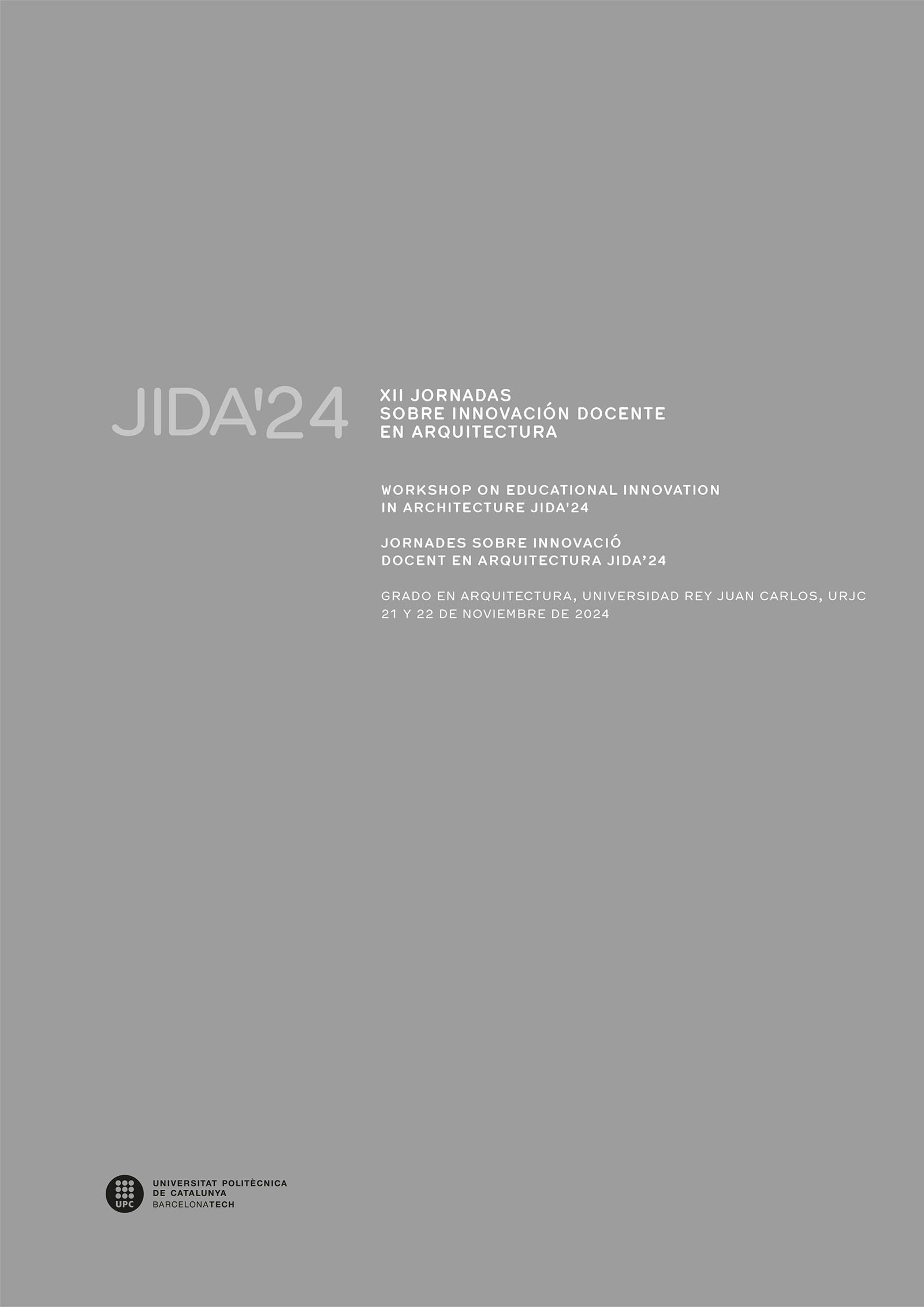Simulating a judicial process: when analog prevails
DOI:
https://doi.org/10.5821/jida.2024.13208Keywords:
claim, legal process, expert report, legal expert, forensic architectAbstract
The participation of an architect in a judicial process is hardly treated in architecture schools. In many cases, these processes culminate with an oral hearing in which judges, lawyers, attorneys, experts, plaintiffs and defendants, witnesses and other agents represent, like in a play, their different roles. The exercise presented in this paper, first proposed three years ago and which has been evolving both in its wording and in its materialization, aims to rehearse all those analogical skills that an architect must show before such an imposing stage and totally distant from the digital world as a courtroom. Based on a hypothetical lawsuit for property damage, two preparatory sessions are planned prior to the third and final session: the oral hearing. This is the activity most highly valued by students in the anonymous surveys conducted at the end of the course.
References
Almonacid Canseco, Rodrigo. 2017. «Innovación docente en Arquitectura para la generación millenial». En JIDA Textos de Arquitectura, Docencia e Innovación 4, editado por Daniel García-Escudero y Berta Bardí-Milà, 10-12. Barcelona: Colección JIDA.
Bagacean, Cristina et al. 2020. «Simulated patient and role play methodologies for communication skills and empathy training of undergraduate medical students». BCM Medical Education, 20(1): 491. https://doi.org/10.1186/s12909-020-02401-0
Boskuc, Natasha y Hu, Sharon. 2015. «Gamification in higher education: How we changed roles». Proceedings of the European Conference on Games-based Learning, 741 – 748.
Bueno I Torrents, David. 2015. «Una visió neurocientífica de l’educació. Un nou paradigma de l’aprenentatge». En JIDA Textos de Arquitectura, Docencia e Innovación 2, editado por Daniel García-Escudero y Berta Bardí-Milà, 10-12. Barcelona: Colección JIDA.
Campos, Neila et al. 2020. «Simulation-based education involving online and on-campus models in different European universities». International Journal of Educational Technology in Higher Education, 17(11): 8. https://doi.org/10.1186/s41239-020-0181-y
Chernikova, Olga et al. 2020. «Simulation-Based Learning in Higher Education: A Meta-Analysis». Review of Educational Research, 90(4): 499 – 5411. https://doi.org/10.3102/003465432093354
González Granada, Piedad et al. 2010. «Acción pedagógica de simulación de juicios. Metodología docente de derecho procesal en el EESS». Revista jurídica de Investigación e Innovación Educativa, 2: 81-92.
Gómez-Martinho Palacio, Lucía. 2020. Modelo metodológico de argumentación técnica para el dictamen pericial de patología de la edificación. Tesis Doctoral. Universidad Politécnica de Madrid. https://oa.upm.es/65768/1/LUCIA_GOMEZ_MARTINHO_PALACIO.pdf
Greenfield, Patricia Marks. 2016. «Jerome Bruner (1915-2016)». Nature, 535(7611): 232.
Ibor Ridaura, Gabriel. “Aspectos prácticos y recomendaciones Dictamen Pericial”. Agrupación de Peritos COACV. https://acortar.link/1Mibxc
Jivet, Ioana et al. 2020. «From students with love: An empirical study on learner goals, self-regulated learning and sense-making of learning analytics in higher education», Internet and Higher Education, 47: 100758. doi: 10.1016/j.iheduc.2020.100758
Kolb, David A. 1984. «Experience as the source of learning and development». En Experiential Learning, 20-38. Englewood Cliffs, New Jersey: Prentice-Hall, Inc.
Larrosa Amante, Miguel Ángel. «El sistema procesal de designación judicial de peritos en relación con el problema de especialidad y competencia». Unión de Arquitectos Peritos y Forenses de España. Accedido 27 de julio de 2024. https://acortar.link/Pt3c0a.
Llopis Nadal, Patricia. 2020. «La simulación de juicios como actividad de innovación docente del Grado en Derecho». Anuario de Facultade de Dereito da Universidade da Coruña, 24: 222-230.
Luttenberg, Katharina et al. 2014. «From board to bedside - Training the communication competences of medical students with role plays» BCM Medical Education, 14(1):135. doi: 10.1186/1472-6920-14-135
Madalina Boboc, Silvia y Vicente Mampel, Ciara. 2021. «El desarrollo de las competencias orales en el Grado en Derecho a través de la participación en competiciones de arbitraje (Moot Courts)». Revista de Educación y Derecho, 21.
Mària Serrano, Magda. 2019. «Enseñando en adverbio». En JIDA Textos de Arquitectura, Docencia e Innovación 6, editado por RU Books e IDP-UPC, 250-253. Barcelona: Colección JIDA.
Maya, Jesús y Maraver, Jesús. 2020. «Teaching-learning processes: Application of educational psychodrama in the university setting». International Journal of Environmental Research and Public Health, 17(11):3922. https://doi.org/10.3390/ijerph17113922
Naciones Unidas. «Informe de los Objetivos de Desarrollo Sostenible. Edición Especial. 2023». Accedido el 28 de agosto de 2024. https://acortar.link/7P71R0.
Reguart Segarra, Núria. 2023. «Las competiciones de juicio simulado desde la perspectiva del coach: a propósito de la primera edición de la Moot Court AEDEUR». Revista de Educación y Derecho, 27.
Trohler, Daniel. 2013. «The technocratic momentum after 1945, the development of teaching machines, and sobering results». Journal of Educational Media, Memory, and Society, 5(2): 1 – 19. doi: 10.3167/jemms.2013.050201. https://orbilu.uni.lu/bitstream/10993/9387/1/s1_JEMMS_050201.pdf
UNE. 2019. Criterios generales para la elaboración de informes periciales. UNE 197001:2019. Madrid. AENOR
UPV/EHU. «Catálogo de competencias transversales de la UPV/EHU». Accedido 27 de julio de 2024.



















